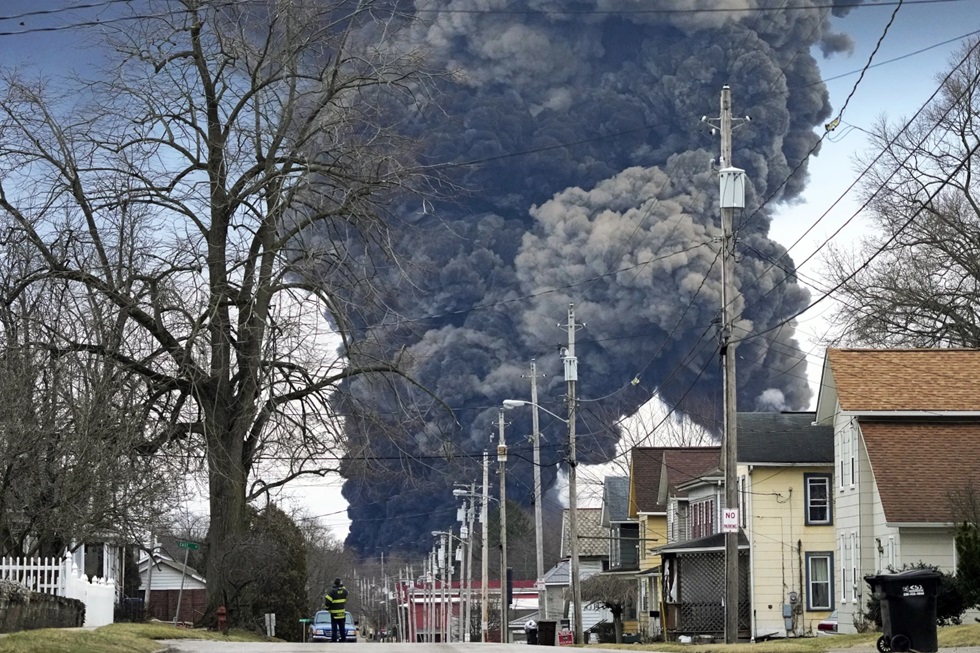
EAST PALESTINE, Ohio —The proposed $600 million settlement of a 100,000-person class action suit against Norfolk Southern for its toxic freight train derailment just over a year ago is drawing flak—even if the union whose members got sick cleaning up the messy aftermath, the Brotherhood of Maintenance of the Way Employees/Teamsters, hasn’t discussed the case, yet.
The chief critics are East Palestine residents who believe no amount of money can give them their health—or their homes—back. Others worry that by the time the funds get divvied up, the remaining residents of the small Ohio town will be left with little to show. And the settlement mandates that anyone unhappy with their share, after agreeing to the settlement, loses the right to sue.
Norfolk Southern reached the tentative deal with lawyers for the class action filers. People who sued come from within a 20-mile radius of East Palestine. People who live within 10 miles of the site and who were injured by the toxic gases that ascended in a cloud over East Palestine get paid, too.
The larger radius extends to East Palestine’s surrounding Columbiana County and far western Pennsylvania. The Norfolk Southern freight train derailed only blocks from where the tracks cross from one state to the other. A federal judge handling the suit must OK the agreement, first.
Some 38 freight cars, including 11 which carried toxic chemicals, derailed in subzero weather a year ago last February, after an overheated cracked axle on one car broke, derailing that car, and taking much of the miles-long train down with it.
A planned release of the chemicals, designed to prevent an even worse disaster, produced the cloud after initial leaks poisoned both groundwater and the river through East Palestine. That killed thousands of fish. And 39 Maintenance of Way members sent later to clean up the mess got sick, too, from pounding headaches and nausea.
More than 40% of East Palestine’s 4900 residents had to evacuate. Some wound up living in hotels for months. Norfolk Southern picked up the tab.
The derailment revealed a host of safety problems with the nation’s freight railroads, and the fact that for years the federal government let the rail carriers, in so many words, regulate themselves.
Meanwhile, in the name of profits for their Wall Street backers, rail execs cut one-third of their workers—including safety inspectors—in the last decade, ordered remaining workers to overlook safety problems and set managerial bonuses based on how many freight cars rolled, not on whether they rolled safely or not.
It’s reports like what happened to the union members which prompted some residents to criticize the settlement and plan to sue on their own.
“My life has flipped upside down,” Eric Cozza, who recently moved away from the town, his lifelong home, told WTAE-TV. He signed onto the class action suit, but now he’s rethinking that.
“I have nodules on my lungs, I have liver problems that I have to go get a biopsy on. There are still people who are having problems, and they’re putting a price tag on our health. You can’t put a price on my livelihood or what I went through.”
East Palestine’s mayor told local media Cozza and the other doubters are in the minority. The mayor estimated that four-fifths of town residents are ready to take the money and move on.
But Cozza’s got at least one prominent Ohioan in his corner: Pro-worker Sen. Sherrod Brown, D-Ohio. Brown, working with rail labor unions, drafted comprehensive legislation to re-regulate the nation’s railroads, with the goal of forcing them to put people—and safety—before profits.
Railroad lobbying and campaign contributions have sidetracked that measure so far.
Brown also inserted two specific line items for East Palestine into money bills Congress passed. One allots $2 million to the East Palestine Derailment Response/Residential Well Sampling Project. The county health department, which will run it, reports most residents get their water from wells.
Sampling is “necessary to ensure safe drinking water at homes near the East Palestine train derailment and chemical spill site, where municipal water is not available,” a summary says.
The second specific provision, in the money bill which covers the Centers for Disease Control, tells CDC “to continue working with state and local health departments to develop a long-term follow-up study of the public health impacts of the train derailment.”
Brown is also a skeptic about Norfolk Southern’s safety commitment. Six months after the derailment, he wrote to NS Chairman Alan Shaw with a detailed series of questions and demands about the railroad’s actions, or lack of them. One would void the settlement’s mandate that anyone who agrees to it gives up their right to sue the railroad. Brown wants Norfolk Southern to drop that lawsuit ban.
And Brown also demanded Shaw “change the safety culture” at the railroad away from one that put profits before people. The senator’s website shows Shaw never answered his letter.
We hope you appreciated this article. At People’s World, we believe news and information should be free and accessible to all, but we need your help. Our journalism is free of corporate influence and paywalls because we are totally reader-supported. Only you, our readers and supporters, make this possible. If you enjoy reading People’s World and the stories we bring you, please support our work by donating or becoming a monthly sustainer today. Thank you!












Comments